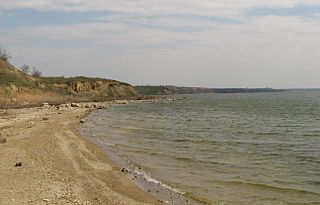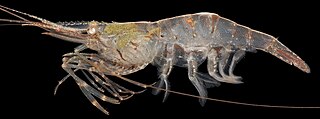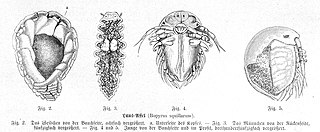
Palaemon is a genus of caridean shrimp in the family Palaemonidae.

Palaemon serratus, also called the common prawn, is a species of shrimp found in the Atlantic Ocean from Denmark to Mauritania, and in the Mediterranean Sea and Black Sea.

Palaemon adspersus, commonly called Baltic prawn, is a species of shrimp that is frequent in the Baltic Sea, and is the subject of fisheries in Denmark. It is up to 70 mm (2.8 in) long, and lives in Zostera beds.

The grass goby is a species of goby native to the Mediterranean Sea, the Sea of Azov and the Black Sea. It is the only known member of its genus.

Khadzhibey Estuary, or Khadzhibeyskyi Liman, is an estuary of the north-western part of the Black Sea, located on the north-west from the City of Odesa. It is named after the former Khadzhibey fortress.

Palaemon varians, known as the Atlantic ditch shrimp and variable shrimp, is a caridean shrimp found from the Baltic Sea and the British Isles to the western Mediterranean Sea. It reaches up to 5 cm (2.0 in) in length and is never found in fully marine conditions, instead living in brackish water.
P. adspersus may refer to:

Palaemon debilis is a species of shrimp of the family Palaemonidae.

Palaemon longirostris is a species of shrimp of the family Palaemonidae. It is considered an invasive species in the Black Sea.
Palaemon floridanus is a species of shrimp of the family Palaemonidae.
Palaemon ivonicus is a species of shrimp of the family Palaemonidae. There is some speculation that this species may be the same as Palaemon carteri.

Palaemon pandaliformis is a species of shrimp of the family Palaemonidae. It is found along with Palaemon northropi.

Palaemon serenus, commonly known as the red-handed shrimp, rockpool shrimp, or rock-pool prawn, is a species of marine shrimp in the family Palaemonidae native to southern and eastern Australia. They are omnivores, feeding on algae or scavenging for animal matter.
Palaemon xiphias is a species of shrimp of the family Palaemonidae. It is found in the eastern Central Atlantic and the Mediterranean.

Palaemon macrodactylus is a species of shrimp of the family Palaemonidae.
Palaemon maculatus is a species of shrimp of the family Palaemonidae. The species can be found in the Niger Delta and is of commercial importance.

Feeder shrimp, ghost shrimp, glass shrimp, grass shrimp, river shrimp or feeder prawns are generic names applied to inexpensive small, typically with a length of 1 to 3 cm, semi-transparent crustaceans commonly sold and fed as live prey to larger more aggressive fishes kept in aquariums.
Processa edulis is a species of caridean shrimp found in shallow water in the Atlantic Ocean and the Mediterranean Sea. It mostly inhabits seagrass beds and eelgrass flats, hiding by day and feeding at night. A common name for it is nika shrimp.

Bopyrus squillarum is an isopod parasite of the infraorder Epicaridea. As such, B. squillarum is an ectoparasite, feeding off crustaceans hemolymph. This parasite is specific to common prawns, but can rarely be found on other species of the genus Palaemon such as P. elegans.













